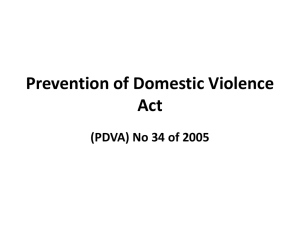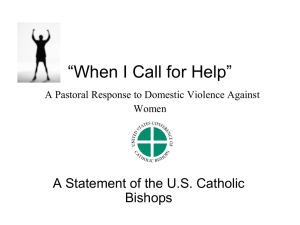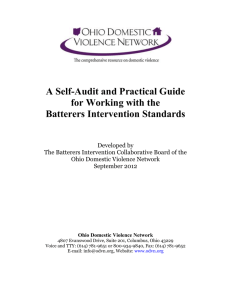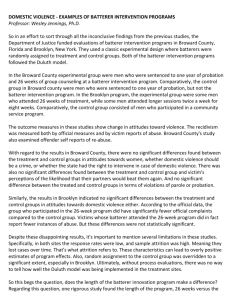Dynamics of DV - Illinois Family Violence Coordinating Councils
advertisement
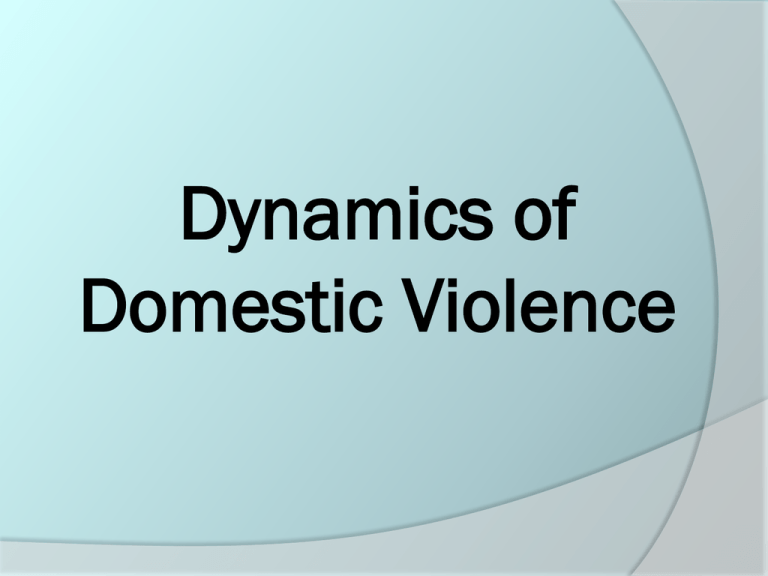
Dynamics of Domestic Violence What is Domestic Violence? (1) Any abusive or coercive behavior or threat used to control an intimate partner • Includes multiple actions • a pattern of manipulative and violent tactics What is Domestic Violence? (2) Affects every • • • • • • social/economic class race or ethnic group age religious group sexual orientation geographic or educational group The majority of domestic violence is perpetrated by men against women. Guiding Principle #1 The Safety of the Victim is PRIORITY Guiding Principle #2 Abusers must be held accountable assume responsibility Guiding Principle #3 Reduce future abuse through: Arrest Prosecution Incarceration Education Guiding Principle #4 A Consistent and Coordinated Community Response. Domestic Violence Facts (1) Domestic Violence is primarily a crime against women Domestic Violence Facts (2) A domestic violence act occurs approximately every 15 seconds in the U.S. Domestic Violence Facts (3) Intimate Partner Murders Domestic Violence Facts (4) Pregnancy and Domestic Violence Domestic Battery (1) 720 ILCS 5/12-3.2 A person commits Domestic Battery if he or she intentionally or knowingly without legal justification by any means: Causes bodily harm to any family or household members as defined in Subsection (3) of section 112A-3 of the Code of Criminal Procedure of 1963, as amended. Makes physical contact of an insulting or provoking nature with any family or household members as defined in Subsection (3) of Section 112-3 of the Code of Criminal Procedure of 1963, as amended. Domestic Battery is a Class A Misdemeanor Domestic Battery (2) 720 ILCS 5/12-3.2 Domestic Battery is a Class 4 Felony if the defendant has any prior conviction under this Code for domestic battery, aggravated battery, stalking, aggravated stalking, unlawful restraint, or aggravated unlawful restraint when committed against a family or household member Power and Control Model Batterers gain and maintain power and control - actual and assumed power. Batterers use strategic, abusive tactics to reinforce control. Power and Control Wheel (1) Power and Control Wheel (3) Coercive Techniques Emotional Abuse Intimidation Attempts to Isolate Victims Threats Use of Male Privilege Economic Abuse Manipulation Victimization of Children Sexual Violence Physical Violence Crimes in the Context of Power & Control Crimes as Tools for Batterers Coercion Intimidation Control Punishment Revenge Crimes in the Context of Power and Control Destruction of Victim’s Possessions may be charged as Crimes Vandalism/Criminal Mischief Cruelty to Children Cruelty to Animals Cycle of Violence Phase 2: Battering Incident - Violent incident happens. Victim may dissociate to get through incident. Almost always happens in private. Phase 1: Tension Building Phase - Victim tries to keep the peace and cover up abuser’s behavior. Abusive behavior begins to escalate and tension builds. Phase 3: Honeymoon Phase - Abuser promises to change and never hurt victim again. Abuser is loving and kind. Chart by Domestic Abuse Project, Minneapolis, MN and by Cheryl Howard Mac and Lola Lola What is the impact on Lola when she is arrested or sanctioned for her domestic violence? What is the impact on Mac? Guiding Principles Introduction, page 5 Alcohol, drugs and anger are aggravating factors which contribute to the abuse, but are not the cause of domestic violence These factors never excuse abuse Battering For the batterer, the violence is about power and control The victim has no control over the batterer’s violence Why Do Batterers Batter? (1) Why Batterers Batter? It’s a choice It works Learned behavior Society says it’s okay Batterers do not abuse because of… Alcohol Stress Illness Genetics Why does law enforcement get so many alcohol-related domestic violence calls? Why Does She Stay? (1) Why Does She Stay? (2) Fear of what the batterer may do Threats of homicide and/or suicide Safety Fear of the unknown Why Does She Stay? (3) Finances Isolation Stalking Why Does She Stay? (4) Uprooting Children Custody Homelessness Children father need their Why Does She Stay? (5) Religion Promises Lack of Transportation Obstacles Faced by Rural Victims (1) Large Geographic Area Isolation from family and friends Transportation issues Extended response time by law enforcement Long distance to reach victim services Obstacles Faced by Rural Victims (2) Rural Beliefs & Traditions Fear How Do Violent Relationships End? The batterer gets help for his/her problem. The victim leaves. Someone dies. What Doesn’t Work? (1) “Attacking” the Victim What Doesn’t Work? (2) Empowering the Abuser What Doesn’t Work? (3) Couples Counseling * What Works? (1) Quality Arrest & Prosecution Decisions * What Works? (2) Offender Accountability 1. Arrest 2. Evidence-Based Prosecution * What Works? (3) Offender Accountability 3. Partner Abuse Intervention Program (PAIP) * What Works? (4) Victim Assistance Training Exercise Handling the Call: Domestic Violence Vignettes Scene 15 “My Crazy Wife Stabbed Me!” Acknowledgements Resources provided by: - Mark Wynn, Wynn Consulting – www.markwynn.com - Lydia Walker, Domestic Violence Trainer/Consultant, LydiaWalker@cox-internet.com - 4th Judicial Circuit FVCC Law Enforcement Committee - OVW Rural Grant Committee, 4th Judicial Circuit - Illinois Department of Public Health, http://www.idph.state.il.us/about/womenshealth/factsheets/dv.htm - National Coalition Against Domestic Violence, http://www.ncadv.org/files/DomesticViolenceFactSheet(National).pdf - Law Enforcement Resource Center & Minnesota Program Development, Inc., 2000 This project was supported by Grant #2011-WE-AX-0055, awarded by the Office on Violence Against Women, U.S. Department of Justice, through the Illinois Violence Prevention Authority. The original project was supported by Grant # 2008-WR-AX-0016, awarded by the Office on Violence Against Women, U.S. Department of Justice, through the Illinois Criminal Justice Information Authority. Points of view, opinions, findings, conclusions or recommendations contained within this document are those of the author and do not necessarily represent the official position or policies of the U.S. Department of Justice, Office on Violence Against Women, Illinois Violence Prevention Authority, or the Illinois Criminal Justice Information Authority.





